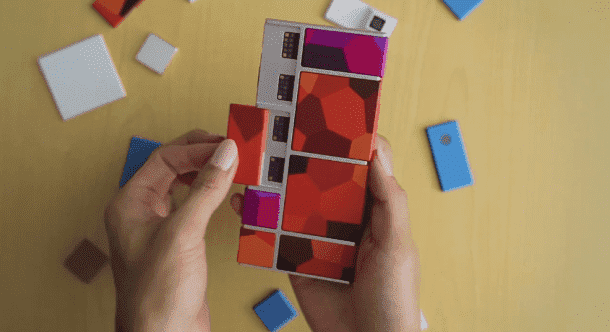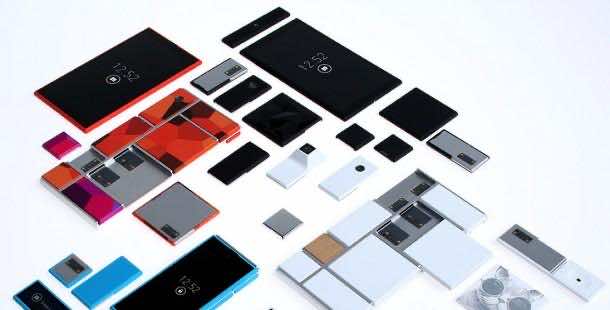 About two months back there was a great hype about ‘phonebloks’ where one will be able to upgrade/change any hardware feature of their smartphone they wished to. The idea came from a designer, Dave Hakkens and now it seems that he wasn’t the only one with this concept in mind, say hello to Motorola’s project Ara. According to Motorola, they have been working on this idea for the past 1 year and the idea has already resulted in the first actual prototypes. The hardware, in this particular future smartphone would be in form of modules that will be attached to an endoskeleton and will be upgradable or changeable.
About two months back there was a great hype about ‘phonebloks’ where one will be able to upgrade/change any hardware feature of their smartphone they wished to. The idea came from a designer, Dave Hakkens and now it seems that he wasn’t the only one with this concept in mind, say hello to Motorola’s project Ara. According to Motorola, they have been working on this idea for the past 1 year and the idea has already resulted in the first actual prototypes. The hardware, in this particular future smartphone would be in form of modules that will be attached to an endoskeleton and will be upgradable or changeable.
 That is precisely the reason why phonebloks got so much press and attention. Truth be told, the vision sure was an innovative one. Imagine a future where one need not to upgrade their smartphone every year or two but will have the option of upgrading individual components which they wanted to upgrade or replace. This sure will prove to be a breakthrough for the smartphone industry. So basically, Project Ara is Motorola’s take on the same concept where the company is busy in the development of a free and open hardware platform which will eventually become the designing guide for future modular smart phones. Motorola says that it’s trying to do ‘what the Android platform has done for software’ for the hardware market and wants to; ‘create a vibrant third-party developer ecosystem, lower the barriers to entry, increase the pace of innovation, and substantially compress development timelines.’
That is precisely the reason why phonebloks got so much press and attention. Truth be told, the vision sure was an innovative one. Imagine a future where one need not to upgrade their smartphone every year or two but will have the option of upgrading individual components which they wanted to upgrade or replace. This sure will prove to be a breakthrough for the smartphone industry. So basically, Project Ara is Motorola’s take on the same concept where the company is busy in the development of a free and open hardware platform which will eventually become the designing guide for future modular smart phones. Motorola says that it’s trying to do ‘what the Android platform has done for software’ for the hardware market and wants to; ‘create a vibrant third-party developer ecosystem, lower the barriers to entry, increase the pace of innovation, and substantially compress development timelines.’
There isn’t much detail available since this whole idea is in concept phase but Motorola says that Ara hardware will be made up of an endoskeleton. Endoskeleton is primarily a structural frame into which the modules will be slotted. These modules would include the processor, display, extra battery and many other countless components which would make the user-end customization fun and limitless.
 Motorola has in fact teamed up with Hakkens and is not being secretive about the project. They have also invited leading hardware researchers who are working to turn this concept into a real thing. Motorola is soon hoping to start work on the creation of modules for the Ara platform. Till then we can keep our fingers crossed!
Motorola has in fact teamed up with Hakkens and is not being secretive about the project. They have also invited leading hardware researchers who are working to turn this concept into a real thing. Motorola is soon hoping to start work on the creation of modules for the Ara platform. Till then we can keep our fingers crossed!



Hell yeah! I would love this, tired of waiting for new phones with too much “spam” on them. I want to be able to customize without having to buy a whole new phone. Also, there is always a problem with certain things not working properly like the charging port. This would make it soooo much more easier to fix that without being overly charged by phone “doctors”. They charge so much to fix a phone that I might as well buy a new one. But that also depends on how much these “parts” or “upgrades” will cost? Hope they make them cost effective!
Nice idea it’s a open platform for smart valueable users. It’s my phone we proud on u thanks
I hope you give the guy who came up with the idea some money! He really got the future of phones, imo!
Interesting concepts but not something I hadn’t already thought of some time back, in fact back in the days of the XDA.
Why had I thought of it then? Because I had a phone with memory that was too small and thought about soldering off and on memory, I say thought, I never progressed this idea as a) I could potential destroy the phone b) didn’t know enough about micro electronics and c) it was just a thought….
Then my train of thought drifted, to a similar idea to Mr Hakkens, which I admit is a great idea and mine certainly wasn’t thought out into anywhere near that much detail.
So with that in mind, I thought about it and thought that this is actually a step backwards and not a step forwards.
PC’s were always the upgradeable devices and laptops with limited upgrade capability, and for years as technology kept rocketing forwarded and software became bloaty and heavy this really provided a good answer, rather than rip replace you can upgrade on the fly.
This was heavily stimulated by the PC gaming market and over clocking market which gave techies and not so techies (like me!) joy in playing with, well technology and engineering.
But then came along powerful consoles, namely the xbox 360 and PS3. Where the graphics on your original PSX could be absolutely kicked a new one by a huge degree by using a PC with all the latest (and very expensive components) reigned king in the ‘omg look at my FPS era’. The latest generation of consoles rarely required people to spend disturbing sums of money to compete with the same level of graphics and thus making it inefficient to do so, especially when for less than £200 your buying an console with a couple of controllers, ready to go out of the box, no installing, no viruses, a painless and easy to go gaming to experience that could rival many of the PC setups out there.
This is not to say there is no market, it’s just a more specialist market where the elite are very happy at being and there is absolutely nothing wrong with this.
Whilst some of this does still exist, it’s now falling into an even more specialist market. Consoles provided a good enough user experience to satisfy even more of the market which in turn reduces the amount of customizing heads out there.
So why did I go to the world of PC’s and games to explain my point?
Look at Apple and what made them famous – simplicity coupled with amazing design and impressive results.
Look at Android and what made them famous – a cheap alternative to the touch screen smart phone world
But it took time, I had the first Galaxy S and was laughed at many an Apple user for it’s just not a competitor to us in their fan club.
Now they were both right and wrong.
To me, it was a device that cost me a good chunk less than what Apple could offer, it gave me the flexibility to do all those wonderful smart phone things and introduced the concept of App stores and Applications to me, in a different way to the old style nokia phones could.
Move forward a few years and guess what, Android is everywhere, they gained huge market share, mainly at the start due to the low cost option for many, but once that got traction and the revenue started pouring in and more phone manufacturers started offering their handsets as an option for a piece of the pie the application market improved, significantly and as hardware improved and software improved it has devices that have for years been arguably as good as apple.
Now here’s the thing, why has Apple done so well when it took so many attempts from so many manufacturers and versions of Android to get to where it is today?
Simplicity….
It’s really as simple as that, we’re now moving into the eco-system era that Microsoft are attacking heavily along with Android and Apple.
Look at most laptops you buy, you buy and they last. Very rarely is the “upgrade your RAM” the answer to 99% of computing performance issues. Very rarely are people going out and upgrading their CPU’s because it means getting their hands dirty, opening a chassis and doing something.
That and, back to right at the beginning, consumer software and games are no way near as intensive as they once were at every release. I remember upgrading my graphics card once a year.
I’ve had an xbox for 8 years.
I’ve had my laptop for 4 years and recently upgraded to a smaller device that doesn’t even support RAM upgrades – ask me that 10 years ago and I’d have said no way, I need the expansion.
The reality is whilst this concept is super cool and there is certainly a market for it, it’s not going to be the mainstream.
Architectures change, components change, technology changes which means in order to have comparability at day 1 you may need say 20 components in inventory. When that new processor is released 6 months later you then need to support that.
Fundamentally you won’t be able to squeeze this many “upgradeable” components into a device equally as powerful. Then you have to cater for the cost of all of these components to be manufactured.
Traditionally factories are buying these in by the 1,000 and mass assembling. Now we’re expecting to flood the market with god know’s how many variables over a very short span of time and then expect to compete with the others out there?
That’s not going to happen, and consumer history suggests that people want the fastest, prettiest, quickest device in relation to cost.
And hence why Android hit the market and became who they are today competing with Apple.
It’s simple.
You want a device that just works, and integrates exceptionally well and is universally friendly. Then an Apple device is what you want (well until they changed their blasted plug).
You want something as powerful, if not more with a bit more freedom of choice but risk the introduction of complexity, then Android is for you.
You want something that is simple yet not quiet there and a bit more cost effective then Windows is answering your priers.
You want something cheap, but with all the features, Android comes back in to play.
And whilst they all are improving their weaknesses there is one true winner at the moment and that is still Apple.
Because Android isn’t ‘Android’ it’s Google who are not making anything near as much as Apple per device making Apple the winner on the profit line.
You want freedom of choice and you opt for this concept, and I love the idea of it your asking for complications down the road and in my opinion are placing money into something that in it’s current form doesn’t have the legs to compete with competition.
The idea is great, but the idea is old, it’s been done for 20 years with PCs and users want simplicity, not complexity in the long run, hence why Apple had that enormous surge of business from the iPod, to iPhone, to iMac to iPad and beyond.
Android came in and offered a cost benefit and won their customers that way
Windows is trying the eco-system route.
I just can’t see space for this in the long run / mainstream.
As for engineering, I think it’s fantastic, and I too would probably buy one.
But then I do own a Windows phone, have had an Android, and an iPhone and use Linux as well as Windows and just bought the new Nexus 5.
Wow, can’t believe I typed so much, this phone just made me re-think my last 20 years of IT and think how the market changed, none of that was planned, my fingers just did a marathon across the keyboard.
I’ve not proof read it and not checked it so errors and problems are no doubt in there, but I think people get jist of what I was saying.
It’s BetaMax, it’s HDVD, it’s dead before it’s started, a great concept, and I would love to see a way for it to work…until then I’ll keep buying ready to go bits of kit for a few hundred bucks and replace them every few years, because it’s costing me less than $10 a month to own a phone and less than $5 a month to own a computer!